- Home
- Don DeLillo
Point Omega Page 4
Point Omega Read online
Page 4
"Sits and thinks, that's what he's here for."
"And this movie you want to make."
"Can't do it alone."
"But isn't there a real movie you'd rather do? Because how many people will want to spend all that time looking at something so zombielike?"
"Right."
"Even if he ends up saying interesting things, it's something they could read in a magazine." "Right," I said.
"Not that I go much to movies. I like old movies on television where a man lights a woman's cigarette. That's all they seemed to do in those old movies, the men and women. I'm normally so totally disregardless. But every time I see an old movie on television, I keep a sharp eye out for a man lighting a woman's cigarette."
I said, "Footsteps in movies."
"Footsteps."
"Footsteps in movies never sound real."
"They're footsteps in movies."
"You're saying why should they sound real."
"They're footsteps in movies," she said.
"I took your father to a movie once. Called 24 Hour Psycho. Not a movie but a conceptual art piece. The old Hitchcock film projected so slowly it takes twenty-four hours to screen the whole thing."
"He told me."
"What did he tell you?"
"He told me it was like watching the universe die over a period of about seven billion years."
"We were there ten minutes."
"He said it was like the contraction of the universe."
"The man thinks on a cosmic scale. We know this."
"The heat death of the universe," she said.
"I thought he'd be interested. We were there and gone, ten minutes, he fled and I followed. Didn't talk to me all the way down six flights. He was using a cane then. Slow journey down, escalators, crowds, corridors, finally stairs. Not one word."
"I saw him that night and he told me. I thought I might want to see it. The whole point of nothing happening," she said. "The point of waiting just to be waiting. Next day I went."
"You stayed awhile?"
"I stayed awhile. Because even when something happens, you're waiting for it to happen."
"How long did you stay?"
"I don't know. Half an hour."
"That's good. Half an hour's good."
"Good, bad, whatever," she said.
Elster said, "When she was a child, she used to move her lips slightly, repeating inwardly what I was saying or what her mother was saying. She'd look very closely. I'd speak, she'd look, trying to anticipate my remarks word for word, nearly syllable for syllable. Her lips would move in nearest synchronization with mine."
Jessie was sitting across the table as he was speaking. We were eating omelettes, we ate omelettes nearly every night now. He was proud of his omelettes and tried to get her to watch as he broke the eggs, beat them with a fork and so on, talking all the way through the seasoning and olive oil and vegetables, enunciating the word frittata, but she wasn't interested.
"It was as though she was a foreigner learning English," he said. "She was right in my face, trying to define the words I was uttering, to absorb them and process them. She was looking, thinking, repeating, interpreting. Looking at my mouth, studying my lips, moving her lips. I have to tell you I was disappointed when she stopped doing this. Someone who truly listens."
He was looking at her, smiling.
"She talked to people then, strangers. Still does sometimes. You still do sometimes," he said. "Who do you talk to?"
Jessie shrugging.
"People on line at the post office," he said. "Nannies with children."
She chewed her food, head down, using the fork to twirl the omelette on the plate before she cut it.
We shared a bathroom, she and I, but she rarely seemed to be in there. A small airline kit, the only trace of her presence, was tucked into a corner of the windowsill. She kept soap and towels in her bedroom.
She was sylphlike, her element was air. She gave the impression that nothing about this place was different from any other, this south and west, latitude and longitude. She moved through places in a soft glide, feeling the same things everywhere, this is what there was, the space within.
Her bed was never made. I opened the bedroom door and looked several times but did not enter.
We sat out late, scotch for both of us, bottle on the deck and stars in clusters. Elster watched the sky, everything that came before, he said, there to see and map and think about.
I asked him whether he'd been to Iraq. He needed to consider the question. I didn't want him to believe that I knew the answer and was asking the question in order to challenge the breadth of his experience. I didn't know the answer.
He said, "I hate violence. I fear the thought of it, won't watch violent movies, turn away from news reports on television that show dead or wounded people. I had a fight, I was a kid, I went into spasms," he said. "Violence freezes my blood."
He told me that he had all-source clearance, or access to every sensitive sliver of military intelligence. I knew this wasn't true. It was in his voice and face, a bitter wishfulness, and I understood of course that he was telling me things, true or not, only because I was here, we were both here, in isolation, drinking. I was his confidant by default, the young man entrusted with the details of his makeshift reality.
"I talked to them one day about war. Iraq is a whisper, I told them. These nuclear flirtations we've been having with this or that government. Little whispers," he said. "I'm telling you, this will change. Something's coming. But isn't this what we want? Isn't this the burden of consciousness? We're all played out. Matter wants to lose its self-consciousness. We're the mind and heart that matter has become. Time to close it all down. This is what drives us now.
He refilled his glass and passed me the bottle. I was enjoying this.
"We want to be the dead matter we used to be. We're the last billionth of a second in the evolution of matter. When I was a student I looked for radical ideas. Scientists, theologians, I read the work of mystics through the centuries, I was a hungry mind, a pure mind. I filled notebooks with my versions of world philosophy. Look at us today. We keep inventing folk tales of the end. Animal diseases spreading, transmittable cancers. What else?"
"The climate," I said.
"The climate."
"The asteroid," I said.
"The asteroid, the meteorite. What else?"
"Famine, worldwide."
"Famine," he said.
"What else?"
"Give me a minute."
"Never mind. Because this isn't interesting to me. I have no use for this. We need to think beyond this."
I didn't want him to stop. We sat drinking quietly and I tried to think of further workable prospects for the end of human life on earth.
"I was a student. I ate lunch and studied. I studied the work of Teilhard de Chardin," he said. "He went to China, an outlaw priest, China, Mongolia, digging for bones. I ate lunch on open books. I didn't need a tray. The trays were stacked at the beginning of the line in the school cafeteria. He said that human thought is alive, it circulates. And the sphere of collective human thought, this is approaching the final term, the last flare. There was a North American camel. Where is it now?"
I nearly said, In Saudi Arabia. Instead I passed the bottle back to him.
"You told them things. Were these policy-board meetings? Who was there?" I said. "Cabinet-level people? Military people?"
"Whoever was there. That's who was there."
I liked this answer. It said everything. The more I thought about it, the clearer everything seemed.
He said, "Matter. All the stages, subatomic level to atoms to inorganic molecules. We expand, we fly outward, that's the nature of life ever since the cell. The cell was a revolution. Think of it. Protozoa, plants, insects, what else?"
"I don't know."
"Vertebrates."
"Vertebrates," I said.
"And the eventual shapings. The slither, crawl, biped crouch, th
e conscious being, the self-conscious being. Brute matter becomes analytical human thought. Our beautiful complexity of mind."
He paused and drank and paused again.
"What are we?"
"I don't know."
"We're a crowd, a swarm. We think in groups, travel in armies. Armies carry the gene for self-destruction. One bomb is never enough. The blur of technology, this is where the oracles plot their wars. Because now comes the introversion. Father Teilhard knew this, the omega point. A leap out of our biology. Ask yourself this question. Do we have to be human forever? Consciousness is exhausted. Back now to inorganic matter. This is what we want. We want to be stones in a field."
I went in for ice. When I returned he was pissing off the deck, standing on tiptoe to get the emerging stream to clear the rail. Then we sat and listened to animal cries somewhere off in the thickets and we remembered where we were and didn't speak for a time after the sounds died away. He said he wished he had remained a student, gone to Mongolia, true remoteness, to live and work and think. He called me Jimmy.
"You'll have every opportunity to talk about these things," I said. "Talk, pause, think, talk. Your face," I said. "Who you are, what you believe. Other thinkers, writers, artists, nobody's done a film like this, nothing planned, nothing rehearsed, no elaborate setup, no conclusions in advance, this is completely sort of barefaced, uncut."
I spoke these lines in a whisky babble, half aware that I'd said all this before, and I heard a deep breath and then his voice, quiet and contained, even sad.
"What you want, my friend, whether you know it or not, is a public confession."
This could not be right. I told him absolutely not. I told him I had no intention of doing anything like that.
"A deathbed conversion. This is what you want. The foolishness, the vanity of the intellectual. The blind vanity, the worship of power. Forgive me, absolve me."
I fought off this notion, inwardly, and told him I had no special ideas beyond what I'd described.
"You want to film a man breaking down," he said. "I understand that. What's the point otherwise?"
A man melting into the war. A man who still believes in the righteousness of the war, his war. How would he look and sound on film, in a theater, on a screen anywhere, talking about a haiku war? Had I thought about this? I'd thought about the wall, the color and texture of the wall, and I'd thought about the man's face, the features that were strong but also collapsible in the show of whatever cruel truths might come spilling into his eyes, and then I thought about Jerry Lewis in closeup in 1952, Jerry ripping off his tie as he sang some weepy Broadway ballad.
Before he went inside Elster gripped my shoulder, reassuringly, it seemed, and I remained on the deck for some time, too deeply settled in my chair, in the night itself, to reach for the bottle of scotch. Behind me, his bedroom light went out, brightening the sky, and how queer it seemed, half the heavens coming nearer, all those incandescent masses increasing in number, the stars and constellations, because somebody turns off a light in a house in the desert, and I was sorry he wasn't here so I could listen to him talk about this, the near and far, what we think we're seeing when we're not.
I wondered if we were becoming a family, no more strange than most families except that we had nothing to do, nowhere to go, but that's not so strange either, father, daughter and whatever-I-was.
There was another thing she said, my wife, sympathetically, referring to the way I regarded life on the one hand and film on the other.
"Why is it so hard to be serious, so easy to be too serious?"
The bathroom door was open, midday, and Jessie was in there, barefoot, wearing a T-shirt and briefs, head over the basin, washing her face. I paused at the door. I wasn't sure whether I wanted her to see me there. I didn't imagine walking in and standing behind her and leaning into her, didn't see this clearly, my hands slipping under the T-shirt, my knees moving her legs apart so I could press more tightly, fit myself up and in, but it was there in some tenuous stroke of the moment, the idea of it, and when I moved away from the door I made no special effort to leave quietly.
The caretaker drove up, a squat man wearing a tractor cap and a stud in one ear. He looked after the house when Elster wasn't here, which was roughly ten months of the year, most years. I watched him go around to the side where the propane tank was located. When he came back this way I nodded as he went past me into the house. He showed no sign that he'd registered my presence. I thought he probably lived in one of the eccentric sprawls of shacks, trailers and cars on blocks, small crouched settlements sometimes visible from the paved roads.
Elster followed him into the kitchen speaking about a problem with the stove and I looked out toward the chalk hills and framed myself from that distance, clinically, man in landscape across the long day, barely seen.
Lunch was movable, flexible, eat when and where you want. I found myself at the table with Elster, who examined the processed cheese that Jessie had bought on our last trip to town. He said it was colored with spent uranium and then he ate it, slopped with mustard, between slices of prison bread, and so did I.
She was her father's dream thing. He didn't seem baffled by her stunted response to his love. It was natural for him not to notice. I'm not sure he understood the fact that she was not him.
When he finished the sandwich he moved forward in his chair, elbows on the table, voice lower now.
"I don't have to see a bighorn sheep before I die."
"Okay," I said.
"But I want Jessie to see one."
"Okay. We'll take a drive."
"We'll take a drive," he said.
"At some point we may have to get out of the car and climb. I think they spend time on rock ledges. I'd like to see one myself. I don't know why exactly."
He leaned in closer now.
"You know why she's here."
"I assume you wanted to see her."
"I always want to see her. Her mother, this was her mother's idea. There's a man Jessie sees."
"Okay."
"And her mother has certain ideas concerning his designs or just his general manner or his appearance or something. And she stated in her authoritarian way that possibly Jessie ought to put some distance between them, for now, temporarily, as a test of her attachment."
"So here she is. And you've talked to her about this."
"Tried to. She doesn't say much. There's no problem, that's what she says. Seems to like the guy. They see each other. They talk."
"How close are they?"
"They talk."
"Do they have sex?"
"They talk," he said.
We were both hunched over the table now, facing each other, speaking in uneasy whispers.
"Has she ever had an affair?"
"I admit I've wondered."
"No serious boyfriends."
"I don't think so, no, absolutely."
"Her mother sent her. This has to mean something."
"Her mother's a gorgeous woman, even today, but bad blood persists between us and when she sends the girl in my direction, yes, it means something. But she's also crazy. She's a completely manic individual who exaggerates everything."
"The guy's not a stalker. Nothing like that."
"Christ, no, not a stalker, I hate that word. Maybe persistent, that's all. Or stutters. Or has one brown eye and one blue eye."
"Wives. What a subject," I said.
"Wives, yes."
"How many?"
"How many. Two," he said.
"Just two. I thought maybe more."
"Just two," he said. "Feels like more."
"Both crazy. I'm only guessing."
"Both crazy. Over the years it ripens."
"What, being crazy?"
"You don't see it at first. Either they conceal it or it just needed to ripen. Once it does, it's unmistakable."
"But Jessie's the treasure, the blessing."
"That's right. And you?"
"No kids."
"Your wife. The separated wife. Is she crazy?"
"She thinks I'm crazy."
"You don't believe that," he said.
"I don't know."
"What are you protecting? She's crazy. Say it."
We were still whispering, we were bonding in whispers, but I wouldn't say it. I sat back and closed my eyes for a moment, seeing my apartment, clear and still and empty, four in the afternoon, local time, and there seemed more of me there in that dusty light than there was here, in the house or under open sky, but I wondered if I really wanted to go back to being the man who lives in the two rooms that are surrounded by the city that was built to measure time, in Elster's formulation, the slinking time of watches, calendars, minutes left to live.
Then I looked at him and asked if there was a pair of binoculars in the house. We'll need binoculars for the expedition, I said. He seemed puzzled by this. The bighorn sheep, I said. If we don't get swept away in a flash flood. If the heat doesn't kill us. We'll want to have binoculars handy to see detail. The male is the one with the horns, big and curved.
She said something funny at dinner about her eyes being closer together in New York, caused by serial congestion in the streets. Out here the eyes move apart, the eyes adapt to conditions, like wings or beaks.
Other times she seemed deadened to anything that might bring a response. Her look had an abridged quality, it wasn't reaching the wall or window. I found it disturbing to watch her, knowing that she didn't feel watched. Where was she? She wasn't lost in thought or memory, wasn't gauging the course of the next hour or minute. She was missing, fixed tightly within.
Her father tried hard not to notice these times. He sat across the room with his poets, moving his lips as he read.
I approached Richard Elster after a talk he gave at The New School and wasted no time, telling him about my idea for a film, simple and strong, I said, man and war, and he wasted no time either, leaving me rooted to a midsentence gesture but only momentarily. I followed him down the hall, speaking less rapidly, and then onto the elevator, still talking, and when we were out on the street he looked at me and commented on my appearance, saying that I looked like him when he was much younger, an underfed overworked student. I took this as encouragement, gave him my card and listened to him read it aloud, Jim Finley, Deadbeat Films. But he wasn't interested in being in a movie, mine or anyone's.

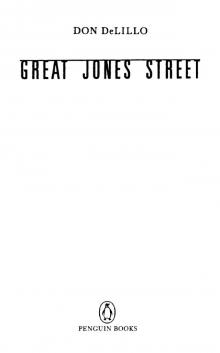 Great Jones Street (Contemporary American Fiction)
Great Jones Street (Contemporary American Fiction)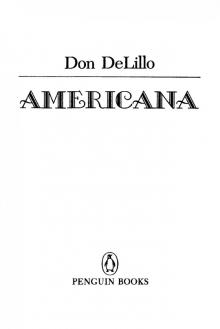 Americana
Americana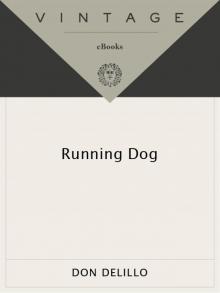 Running Dog
Running Dog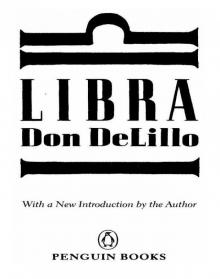 Libra
Libra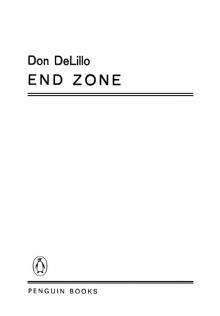 End Zone
End Zone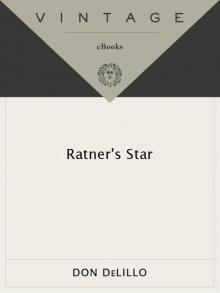 Ratner's Star
Ratner's Star Underworld
Underworld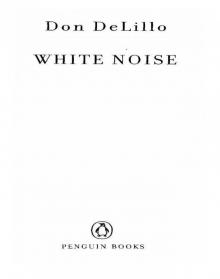 White Noise
White Noise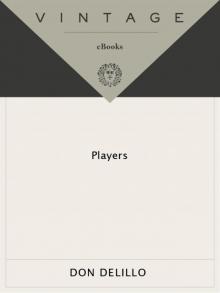 Players
Players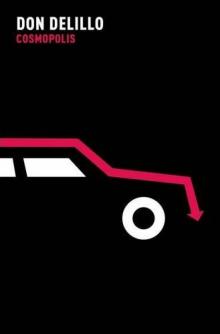 Cosmopolis
Cosmopolis The Silence
The Silence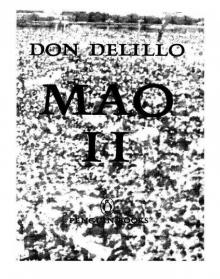 Mao II
Mao II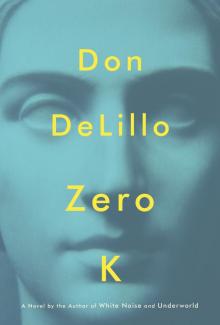 Zero K
Zero K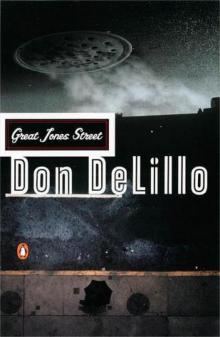 Great Jones Street
Great Jones Street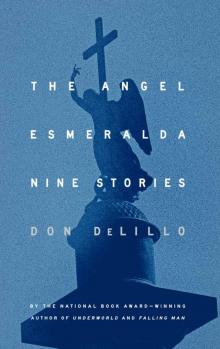 The Angel Esmeralda
The Angel Esmeralda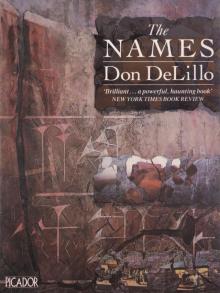 The Names
The Names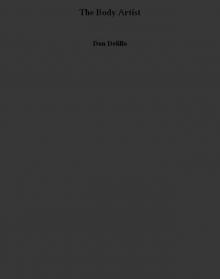 The Body Artist
The Body Artist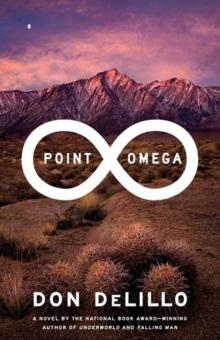 Point Omega
Point Omega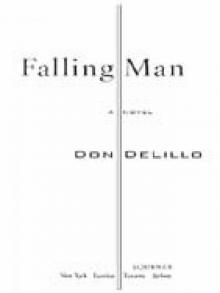 Falling Man
Falling Man